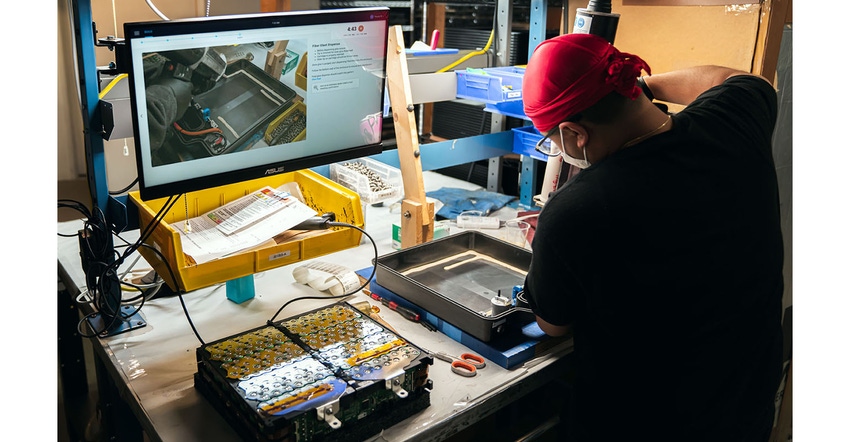The Essential Mission to Digitize Battery Manufacturing
Perfecting manufacturing execution by capturing vital data benefits manufacturers and customers alike.
September 1, 2023

With the global boom in showplace billion-dollar battery manufacturing plants, it pays to remember that a great majority—some say more than 95%—of American manufacturing consists of businesses with 500 employees or fewer. Companies that stamp, injection mold, coat and plate, test and inspect, and assemble battery components such as busbars, terminals, connectors, and pack enclosures must be able to do so with precision and in line with stringent customer specifications.
Every production step from receiving raw material to transforming it into a finished component generates data, and the ability to track, analyze, adjust, and report that data and all their relationships with speed and accuracy is essential to manufacturing success.
“Consider it the difference between thinking and knowing,” says Ryan Kuhlenbeck, co-founder and CEO of Pico MES, a manufacturing execution system software provider based in San Francisco. “You need to know.”
A battery and EV manufacturing veteran with Tesla and GM experience, Kuhlenbeck views providing battery component suppliers and other manufacturers with digital knowledge frameworks as a return to first principles in manufacturing: know what you’re building; use the right tools, convey instructions explicitly, track your processes, and learn from your mistakes. ”Every one of these things is extremely powerful, and making data collection digital instead of clipboard-based allows us to show customers some really cool stuff.”
Millions in support
Investors are taking notice as well. On Aug. 22, Pico MES announced a $12.35M Series A investment led by Bosch Ventures and joined by new investors from Counterpart Ventures and Momenta. Existing company investors Lemnos, Congruent Ventures, Union Labs, and SE (Schneider Electric) Ventures also participated in the round.
Part of the reason for the interest is the way Pico MES is put together. Pico MES is designed for the average factory worker—connecting the tools and other means of production with the people who use them, capturing and measuring shop-floor processes, and making a digital record. Facilitating this is an ever-expanding pre-built library of tools and machine integrations that reduces the need for software engineers to custom-build each installation. Pico also provides low-cost IoT hardware for connecting tools and processes, making it dramatically less expensive than the programmable logic controllers (PLCs) and industrial PCs necessary in traditional MES projects.

Additionally, Pico MES is an affordable, no-code platform exponentially faster than conventional analog methods and includes an open API for connecting to other critical systems on the shop floor. Pico MES is also fast to deploy, enabling remote installations in just hours, the company says.
“In order for factories to remain competitive they need to digitize their labor‐intensive production setups,” said Ingo Ramesohl, managing director of Bosch Ventures. “Bosch has several thousand suppliers that could benefit from visibility into the supply chain. The mid-market has the most pain and makes up for over 50 percent of the supply chain so there’s a great need for Pico MES.”
“Digital manufacturing solutions provide massive efficiency gains for enterprises but have often ignored mid-size factories due to smaller sizes and budgets,” Kuhlenbeck adds. “American manufacturing cannot succeed without the supply base of mid-size factories. Pico MES connects these factories with their OEM customers, enabling visibility up and down the supply chain and creating a new level of efficiency gains for all.”
Lithos learns
Lithos Energy is a Silicon Valley-based manufacturer of high-performance lithium-ion battery systems engineering for the most demanding environments, offering what it calls “Gen4 Technology”—battery pack designs combining the best attributes and insights from many projects across several verticals. This means new or evolving projects can scale up rapidly while integrating process specifics for achieving power, energy density, safety, and performance targets.
Capturing and sharing cycle times, process throughputs, and other data through digital connections to machines and assembly tools is extremely important. “We began working with Pico MES in 2020,” says James Meredith, Lithos CEO, following attempts to work with manufacturing process modules in the company’s ERP software package. “Because they weren’t very well integrated, the result was a lot of overhead. Pico gets it right.”
Meredith also appreciates the shared insight into the importance of battery design and manufacturing. “Running every nut to the right torque and knowing it is the difference between high quality and 100% quality,” he says. Adding process efficiencies like saving time through automatically logging process information gives the company more time to focus on product and process improvement.
Lithos customers are noticing as well. Earlier this year, Caterpillar announced it was investing in Lithos to support its electrification efforts in mining and construction equipment.
Currently, Pico MES says it can connect more than 1900 devices from 150 product families to digitally connect the shop floor. The company says to anticipate new tools being added on a weekly basis.
About the Author(s)
You May Also Like





